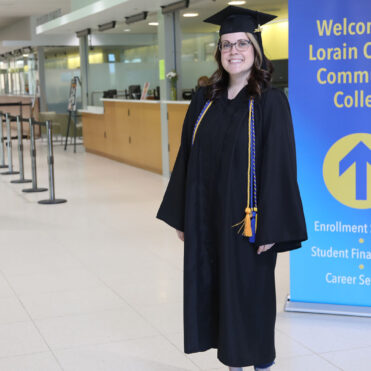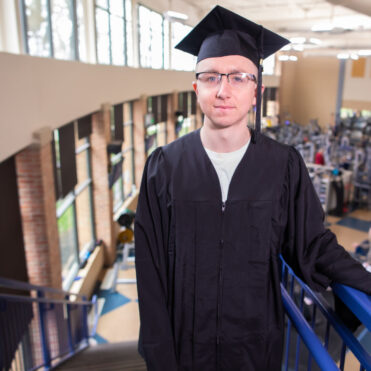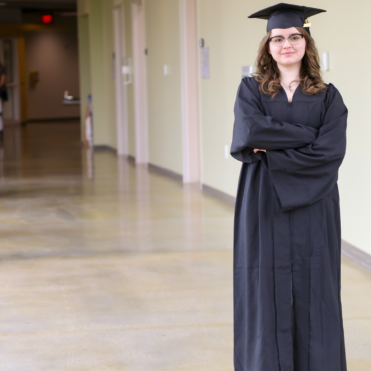C. Lee Pratt
Associate of Arts
LCCC Grad Lee Pratt accepted to Johns Hopkins Collaboratory for Undergraduate Research
Lorain County Community College graduate Campbell Lee Pratt will be spending this summer in Baltimore, Maryland, as part of the prestigious Johns Hopkins Humanities Collaboratory for Undergraduate Research. The Collaboratory provides opportunities for humanities students from community colleges and Historically Black Colleges and Universities across the country to participate in an intensive and innovative summer research experience.
“I completely lost my mind; I started crying right away,” Pratt, 21, says of learning their acceptance. “It was the most competitive year for applications and I was one of the 23. I’m very excited.”
Students in the Collaboratory work together constructively while pursuing individual research projects. At the end of the 10-week program, students present the outcome of their research to the community. During the application process, Pratt had to submit a 1,000-word essay about their student experience and expectations for the program.
“Growing up queer, I didn’t really see myself in media or works,” Pratt says. “I talked about how experiences of marginalized people can be seen and learned from through literary works, and how studying those works can make students feel more represented.”
Pratt grew up in Amherst, attending Marion L. Steele High School and taking College Credit Plus classes at LCCC during senior year. The introduction to LCCC made an impression and they enrolled full time after high school graduation.
“One of the things that I loved about Lorain County Community College is that the professors were a lot more hands on than what you would have gone into it expecting,” Pratt says. “They really fostered an environment where you can grow and make mistakes and take time to figure out what you want and need from your career and your education.”
Pratt began working toward an associate of arts degree with a focus on humanities, reading and writing poetry in their free time.
“Poetry writing and reading offers an escapism from a world that seems hostile sometimes,” Pratt says. “It gives you a safe space to explore the bigger feelings that you might be experiencing, but don’t necessarily want to share with the outside world quite yet.”
While attending LCCC, Pratt went through some emotionally isolating times, which were exacerbated by financial struggles stemming from the COVID-19 pandemic.
“That made me shut down in a way; it made me become more introverted,” Pratt says.
But Pratt says LCCC professors, who are often emotionally in tune with their students, noticed the shift in demeanor.
“Because of the smaller class sizes, they’re able to put their attention on individuals rather than focusing on the collective,” Pratt says. “They’re able to figure out why students are changing their behaviors.”
Pratt’s professors provided an outlet to verbalize the struggles Pratt had been writing about. One professor in particular, English professor Karin Hooks, Ph.D., offered compassion and flexibility as Pratt worked through challenges brought on by the pandemic.
“When I heard about some of the issues Lee’s family was facing, I reopened exams and extended deadlines so that Lee could finish the semester successfully,” Hooks says.
Hooks also thought of Pratt when the application process for the Johns Hopkins Collaboratory opened in fall 2021. She encouraged Pratt to apply and helped them during the interview process.
“Lee is an amazing student, super prepared, astonishingly well read and well informed about current events,” Hooks says. “Lee made an impact on every class taken and was an obvious fit for the program.”
In December 2021, Pratt graduated from LCCC, transferred to Cleveland State University, and is now working toward a Bachelor of Arts in English degree and a Bachelor of Science in Education degree. Pratt is anxious to begin a summer of research, collaboration, and writing in a city that’s so rich in literary history that it’s known as “The City That Reads.”
“There’s a lot of potential for researching the experiences of marginalized authors,” Pratt says. “But it is in Baltimore and I would like to tap into how Baltimore city life has influenced the growth of horror literature. I think that could be really fun.”
Whatever research topic Pratt chooses, they know the experience will help shape their future. For many Collaboratory participants who are still sorting through potential career plans, the summer program can play a defining role. But Pratt does have a few goals already set, anchored by personal experience.
“I would like to focus my efforts on low income students and students that might not see themselves reflected in literature,” Pratt says. “And I’m hoping that I can make a larger impact on the community and people who helped me get to this point. I want to give back.”



